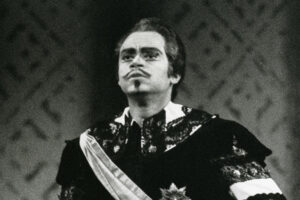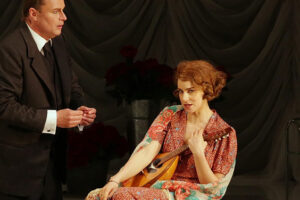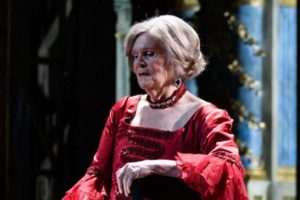
Once upon a time, a man and a woman met. He could sing, she could sing. They fell in love, got married, and became a power couple to rival Billary. I’m talking, of course, of Giulia Grisi and Mario, opera’s original Love Couple. Since Giulia Grisi, many singers have met, fell in love, and married, and marketed themselves as the New Love Couple.
Adelina Patti scandalized society by divorcing her nobleman husband and marrying the tenor Ernesto Nicolini. They were a nice singing duo. She was the star, and he made sure that her name was always the largest on all the posters.
Emma Eames and Emilio De Gogorza were more Odd Couple than Love Couple, but they did record Messager’s “The Swing Song” in which de Gogorza twitters “You are laughing, oh tell me why.” (They divorced eventually, with de Gogorza giving this quote about Eames: “She’s impossible. She makes a fine art of rudeness.”)
The most tragic Love Couple of this current generation was Roberto Alagna and Angela Gheorghiu. Ah, how gorgeous they were! How deep and dramatic was their love! How beautiful were their recordings! Alas, all good things must come to an end, and Bobby/Angela were no exception to that sad rule.
Stephen Costello and Ailyn Pérez are the New New Love Couple. The eschew the dramatics of Alagna and Gheorghiu. The Costello and Pérez pairing has a Dawson’s Peak-like wholesomeness. Both are good-looking in a generically cute way. It’s not surprising that agents and record labels have decided to take advantage of their fresh-scrubbed good-looks and youthful voices by releasing a joint album.
The album’s name? Love Duets. The album is filled with precious glamor shots of the two of them looking very much in love. And just in time for their joint appearance at the Royal Opera House in La Traviata.
The programming is standard fare: operatic selections from Manon, L’amico Fritz, Rigoletto, L’elisir d’amore, Faust, La Traviata and La Boheme, and four Broadway duets from West Side Story, Carousel, Guys and Dolls, and Kismet. Are you guys bored yet? Because I’m already bored writing this.
It would help if Costello and Pérez had voices that weren’t also so Dawson’s Creek. The whole album has some nice moments but nothing to justify the hype. Ms. Pérez has the more attractive voice: a nice, dusky-voiced lyric soprano. Mirella Freni on the cheap is how I’d describe Pérez’s voice. Pérez’s top notes are whitish and screamed, and coloratura ability is unremarkable, but at least she sounds pleasant.
Costello has a pushed, nasal timbre, and his dynamics range from forte to fortissimo. Upper register is forced and strangulated. The close miking gives their voices more body than they’d likely have in a big auditorium—certainly the two times I heard Costello (in Anna Bolena) he was barely audible and ducked his way through “Vivi tu.”
It’s fitting that both Costello and Pérez are Richard Tucker winners and that this CD is “dedicated to the memory of Richard Tucker.” Sometimes Costello seems to be doing a Tucker imitation, with that relentlessly loud, nasal attack. The difference was Richard Tucker’s voice was a large spinto voice who could sing heavy-hitting parts Andrea Chenier and Alvaro. Costello’s like a tenorino who wants to sound like Tucker. His bull in a china shop approach to the standard lyric tenor repertory is a real turn-off.
It’s surprising that this Love Couple show so little intimacy in their duets. They are mostly belted out, Broadway style. In fact, their four Broadway duets are the best part of this album—they have fairly good diction, without that overdone operatic flair, as well as a straightforward, all-American manner that’s appropriate for these classic chestnuts. If they starred in West Side Story, I’d buy a ticket to see them.
But their operatic selections are unremittingly loud, charmless, and clumsily sung. Neither of them seem able to modulate their dynamics at all, or caress a phrase, or do any of the things that separates the Great from the Okay. The duet from Rigoletto has some unusual ornamentation that would be nice if either of them could sing it with any grace.
“Caro elisir” from L’elisir d’amore has zero playfulness from either party. Costello sings the repeated “tra-la-la-la-la’s” as if this were “Vicino a te.” The “O soave fanciulla” thankfully has Costello skipping out on the final high C, but you can go to YouTube and probably turn up a dozen superior versions just from contemporary singers with one search. The Cherry Duet from L’amico fritz is nice but have you ever heard a version of that duet that wasn’t lovely?
I really hope that as Costello and Pérez find a more individual, refined style to their singing as they progress through the operatic scene as the Love Couple. Right now they’re like that expensive dish at an upscale restaurant where you take a bite and realize that underneath all that sauce is Olive-Garden-style rubber chicken.
A palate cleanser is the new album
of the Abzakhian/Russian soprano Hibla Gerzmava. It’s taken from a live concert and it includes the orchestral selections (the overtures of La Clemenza di Tito, Il Barbiere di Siviglia and Norma) as well as duets with baritone Arsen Sogomonian. Unlike the slickly-packaged Love Duets this album doesn’t even come with any liner notes.
Gerzmava’s no spring chicken—Wikipedia lists her age as 44, but her voice is the real thing— a dark, ripe instrument that can handle anything from Mozart’s Laudate Dominum to Medora’s aria from Il Corsaro to Strauss’s “Morgen.”
She’s not perfect. She does have that Russian tendency to swallow the vowels and thus there’s some rather mushy, cloudy diction (Anna Netrebko worked for many years before the potato mouth disappeared). For instance “Casta diva” sounds like “Cowstow divaw.” The voice has a prominent vibrato especially in the upper register that might not be to everyone’s liking. And it sounds as if she’s outgrown some of her album choices.
But the overall impression is that of a soprano of surprising loveliness. The voice has great float, shown to great effect in Desdemona’s double aria. The final A-flat in “Ave Maria” is sublime. Gerzmava is one of those singers who seems to find the center of every note, so the result is a firmness of the musical line that gives everything she sings weight.
And she’s diverse too—even though her voice sounds more like a lirico spinto than a coloratura, “Regnava nel silenzio” shows some lovely trills and a firmness with negotiating the musical line that gives this music shape and texture. She has some discomfort with the fleeter measures of “Quando rapito in estasi” and “Casta diva” betrays some strain in the upper register. But she always has plenty of authority, legato, and characterization. Gerzmava is a lovely singer with a lovely voice.
The baritone is not quite on her level but he does an okay version of “Largo al factotum.” Actually he sounds a bit like a baritenor, and my suspicion was confirmed by some tenor-like high options and ornamentations he takes in the Figaro aria. And the Dulcamara/Adina duet is charming.
Gerzmava is a singer who has gotten assignments in international opera houses (Met, Covent Garden, Vienna) but sticks closely to her home theatre in Moscow (the Stanislavsky). A few YouTube clips suggest that she’s a somewhat stolid stand-and-deliver kind of singer. But hers is a quality voice, with a more complete sound than Marina Poplavskaya, Olga Peretyatko and Ludmila Monastryska, just to name three Slavic sopranos who have gotten more attention. It’s a mystery why she hasn’t had a real breakthrough success. Maybe it will happen next year when she tackles all three Hoffman heroines for the Met.
The dual albums by Gerzmava and the Love Couple demonstrate that in opera, it’s not only about the voice you have, but how you market the package.


























Comments